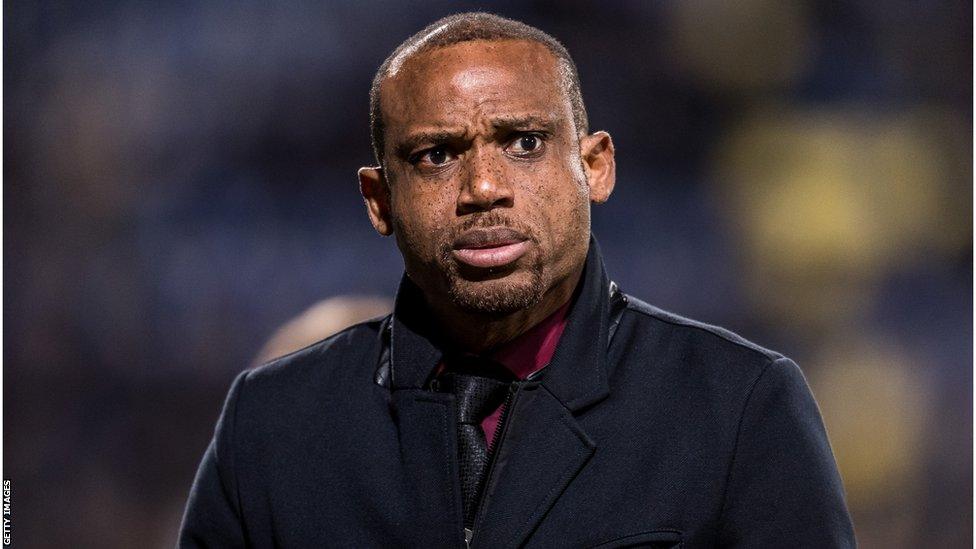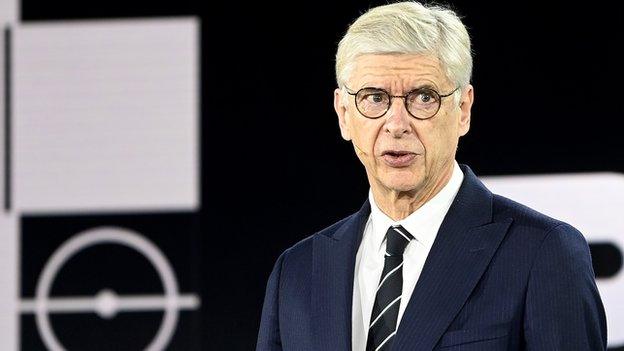Ex-Nigeria boss Oliseh says players must debate biennial World Cup
- Published

Former Nigeria captain and coach Sunday Oliseh has said that current players and coaches must be involved in any discussion about having a World Cup every two years.
Football's governing body Fifa is currently exploring the idea of holding the sport's global showpiece every two years, instead of four.
Ex-Arsenal manager Arsene Wenger, in his position as Fifa's chief of football development, has been speaking to scores of prominent former players in Doha this week about the proposal.
While former stars such as Ronaldo of Brazil and Denmark's Peter Schmeichel have given their backing, Oliseh insists that current players and coaches need to be part of the process.
"I don't think we should be consulting mostly ex-players - we should be consulting the players now," he told BBC World Service's World Football programme.
"The Mbappes, the Benzemas, you have to ask all those ones and they have to give their opinion. They are the actors now.
"To say 'I played three World Cups' would be great for some players, but let's not forget that the actual employer of players are the clubs. No matter what happens with the national team, they are the ones who pay the wages.
"They are the ones giving the players the financial, psychological and health capability to be at their best to participate in major tournaments for their countries.
"So now we are having this discussion, shouldn't the club owners be consulted? Shouldn't the club managers be consulted?"
'My opinions are to go against Arsene'

Arsene Wenger stepped away from football management in 2018, and became Fifa's chief of global football development
While Wenger says he is "100% convinced" his plan for a new international match calendar based on a World Cup every two years is the best way forward for football, Oliseh is not so sure.
The former Arsenal boss has a number of ideas, including:
A biennial World Cup in even years.
Confederation tournaments (including the European Championship) in odd years.
Either one (October) or two (October and March) mid-season international breaks, for a month in total, when qualifying for major tournaments will take place. Groups of four countries are envisaged, with a play-off, for a maximum of seven matches.
Guaranteed rest periods for players once tournaments are over.
"I really respect Arsene and I like him a lot but my opinions are to go against Arsene," added Oliseh, who won over 50 caps for Nigeria (1993-2002) before leading the team as coach (2015-6).
"I am just looking at the principal itself and what it could bring to the game. As someone who loves watching quality football, I think overloading it does not make it better.
"The players will need rest. You are best after you have taken your rest."
Oliseh also has concerns about how the changes would affect the prestige of the World Cup, which many believe is perpetuated by its relative rarity.
"Personally as a player, it would be interesting to say 'OK, in a six-year period, I could play three World Cups'," he said.
"But what actually makes the World Cup exceptional is the build-up to the event - the four-year wait and the fact that sometimes it's a once-in-a-lifetime occasion for certain players."
Despite his reservations and those of others, Oliseh admits he can understand the support of the Confederation of African Football for the proposal.
"I can see why African football is happy with it because it goes with the Africa Cup of Nations which, every two years, helps us to sell ourselves," he pointed out.
"We need it. We need funds coming in like the ones these major tournaments bring in - we need it from that point of view."
It is currently unclear how Africa's national teams can play qualifiers for two separate competitions - the World Cup and Nations Cup - every two years.
Fifa expects a decision to be made on a biennial World Cup later this year.